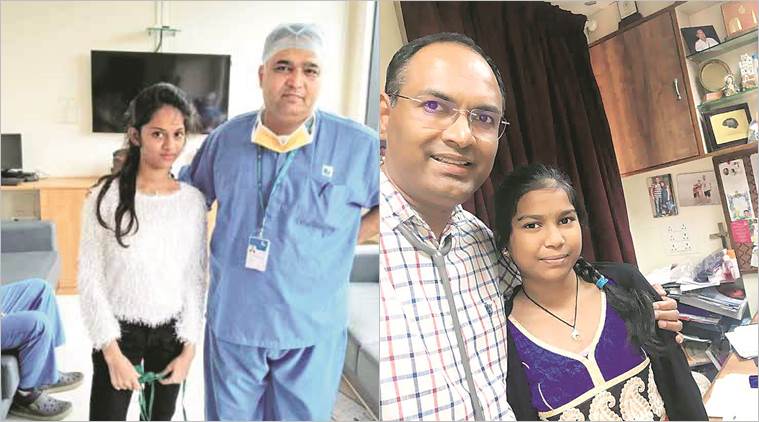World Heart Day: Better outcomes, more support, but number of paediatric heart transplants remains low
On the occasion of World Heart Day, on September 29, the Pune Zonal Transplant Coordination Committee officials said in the last three years, August 2015 till date, 16 heart transplants have been performed in the city, two of which were paediatric heart transplants.

(Left) Dr Sanjeev Jadhav with Suhana Shaikh; Dr Manoj Durairaj with Prerana Sandanshiv.
—Months after her husband Ravindra Sandanshiv, a farmer from Jalgaon, died of a cardiac arrest, Mangala’s 12-year-old daughter Prerana was diagnosed with cardiomyopathy. Mangala could barely make ends meet. Yet, to get the best treatment for her daughter, she travelled from Jalgaon to Dhule, and then to Mumbai and finally Pune, where doctors were able to perform a heart transplant. The donor heart belonged to a brain dead 29-year-old man. A year after the paediatric heart transplant, Prerana is back at school
—12-year-old Suhana Shaikh’s heart function was extremely poor and her family had lost hope. But with increasing awareness about heart transplants, doctors found that the heart size of a brain dead 47-year old-woman was a perfect match with Shaikh. A year since the transplant, Suhana is busy participating in dance competitions
While adult heart transplants have increased in the last couple of years, paediatric heart transplant is still a relatively new field in India. On the occasion of World Heart Day, on September 29, the Pune Zonal Transplant Coordination Committee officials said in the last three years, August 2015 till date, 16 heart transplants have been performed in the city, two of which were paediatric heart transplants.
Paediatric heart transplants are usually for children who have dilated cardiomyopathy or viral myocarditis, said Dr Manoj Durairaj, heart transplant surgeon and director of the Marian Cardiac Centre and Research Foundation. “The results of paediatric heart transplants are much better as a long-term outcome, than that of adults,” he said.
In both the paediatric transplant cases in Pune, adult hearts were implanted. Prerana, who weighed 30 kg, had a 29-year-old person’s heart implanted. The other child weighed 15 kg, and the donor heart was from a 30-year-old woman who weighed 45 kg. The challenges after the surgery include dealing with low immunity levels, and taking medicines regularly, said Durairaj, who treated Prerana and provided post-operative care and support to the family through the Marian Cardiac Centre.
While the children face the risk of developing high blood pressure or convulsions due to higher pumping capacity of the adult heart in a smaller body, the results of paediatric heart transplants were “gratifying,” said Durairaj.
The number of heart failure patients, who need transplants, is quite high, said Dr Sanjeev Jadhav, chief heart lung transplant surgeon at Apollo Hospital in Mumbai. Jadhav, who treated Suhana, said that she was extremely frail and suffered from dilated cardiomyopathy. “She was bed-ridden for a year and was lucky to get the heart of a brain-dead 47-year-old woman,” said Jadhav.
Suhana’s father Azad Ali Shaikh, who works as a driver, said they did receive help from charitable institutions for the surgery, but post-transplant care was also very expensive. The cost of medication ranges between Rs 15,000 to 20,000 per month, and that should come down for the many people who can’t afford it, he said.
For Prerana’s mother Mangala, bearing the cost of post-operative treatment was just not an option. “I lost my husband and months later my daughter was ill for several months. I work at the farm and also as a daily wage labourer. I can’t afford the post-operative treatment and the Marian Cardiac Centre is now supporting Prerana,” said Mangala.
For every 100 heart transplants in India, at least 10 are performed in the paediatric age group and there is a favourable long-term outcome, said Jadhav.
However, the heart transplant programme has been slow to take off due to lack of donor hearts and high expenses, said Dr Milind Hote, professor at Department of Cardiothoracic Surgery, All India Institute of Medical Sciences, New Delhi. “In recent years, the interest in heart transplantations has revived, but there is still little published data on paediatric transplants in the country,” he said. The focus is still on paediatric heart surgeries and of 100 heart surgeries, at least 40-45 are performed on children, he said.


































No hay comentarios:
Publicar un comentario